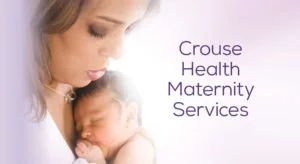Delivering During the Pandemic: Safety First for Babies, Moms, Families
By: Laurie Clark
April 22, 2020
Home » Crouse Connects » Delivering During the Pandemic: Safety First for Babies, Moms, Families

Concerns During COVID-19
She already knows what it’s like to deliver a baby; she has a three-year-old son. Jenn chose to deliver at Crouse’s Kienzle Family Maternity Center for many reasons, but especially knowing that our Baker Regional Neonatal Intensive Care Unit is right onsite should something happen during her pregnancy.
Like any first-time mom, she had a birth plan, but this time around she just hopes everyone is healthy. “I’m praying my husband and I stay healthy up to the birth so we can be together for labor and delivery. I’m praying the staff is healthy and cared for. I hope I have a healthy baby and we all avoid catching anything,” Jenn said.
Utmost in Precautions
On average, 11 babies are born each day at Crouse — and deliveries continue to happen in spite of the global pandemic. Concerns about the current situation now are real. What are members of our OB team telling expectant mothers about delivering now?
“We have taken the utmost in precautions,” assures Betty O’Connor, director of women and infants services, who points out that measures are put in place each year during flu season to protect all hospital patients.
Hospital visitation restrictions were put in place weeks ago that include limiting laboring women to one support person for the entirety of their stay, from delivery until they return home. Everyone who comes into the hospital has their temperatures checked and receives a mask to cover their nose and mouth.
The support person, who must wear a mask at all times, is given a wellness assessment every 12 hours to check for symptoms and have their temperature taken. All staff present at birth wear the appropriate PPE (personal protective equipment).
According to the Centers for Disease Control and Prevention (CDC) there is no evidence to suggest pregnant women have a greater chance of getting COVID-19 than adults who are not pregnant. However, pregnant women should always avoid contact with anyone who’s been sick.
Additionally, the CDC reports that “mother-to-child transmission of coronavirus during pregnancy is unlikely, but after birth, a newborn is susceptible to person-to-person spread.”
Making the Best Out of the Situation
“Our maternity team is amazing and they have been going above and beyond to make sure mothers are comfortable and feeling especially safe and secure,” says O’Connor. We provide iPads to patients to keep them in touch with children and anxious grandparents-to-be. That helps a lot.”
As for mother-to-be Jenn? Awaiting her baby’s arrival, she’s trying to stay positive. “If we’re all healthy, my husband can be there with me for the birth. But, things can change day-to-day. I’m hoping for the best and trying not to stress about it too much,” Jenn says.
Laurie Clark is the Communications and Digital Media Manager at Crouse Health.
Categories: Carepassion, Crouse Services, Women's Services
Tags: Carepassion, Kienzle Family Maternity Center, maternity, motherhood, women's services
Share this
